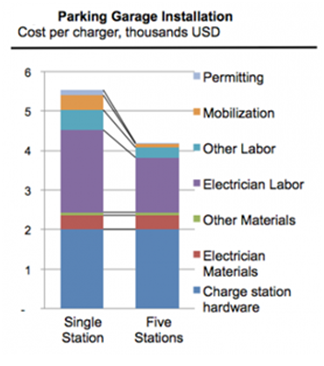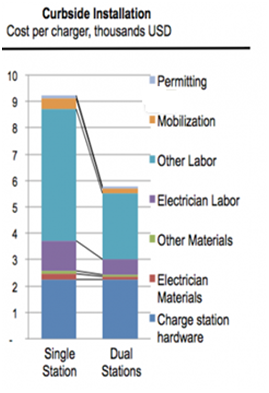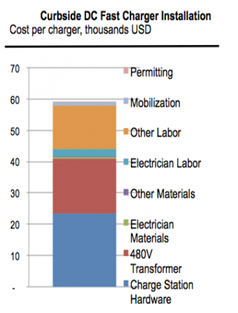Last Updated: February 2020 by Narasimhan Santhanam
Synopsis: With the fast growth of electric vehicles, one can expect a similar growth for EV charging stations too in India. There are different types of EV charging stations, which broadly can be classified into AC (slow charging) and DC (fast charging) stations. Implementing a charging station carries an upfront cost for the hardware, software, and other components such as permits and installation cost, apart from the land cost where applicable. This post provides indicative cost data, along with break-ups, for installing both AC and Dc charging stations.
This pos![]() t is a part of EV Next’s EV Perspectives.
t is a part of EV Next’s EV Perspectives.
EV Next, a division of EAI, is a leading market intelligence & strategic consulting firm for the Indian e-mobility sector.
Get to know about 1000+ EV innovations from EVI2: Electric Vehicle Innovation Intelligence from EVNext
Net Zero by Narsi
Insights and interactions on climate action by Narasimhan Santhanam, Director - EAI
View full playlistIntroduction:
The concept of charging stations is quite nascent and hence the costs for setting up these are also only now emerging. What we have attempted to do in this section is to provide indicative costs for electric vehicle charging stations – please note, however, these are preliminary data points and could vary significantly depending on multiple factors and also could see significant changes between 2018-2020, given the pace at which the entire electric vehicle sector is changing!
The public charging infrastructure can be broadly divided into two types
- Normal AC Charging Stations
- Fast Charging DC Stations
In order to calculate the individual component cost involved in setting up the EV infrastructure for both the above types, the cost has been broken down into the following categories
- Core charging station hardware,
- Associated hardware and materials,
- Electrician and other labor,
- Mobilization, which is defined as the time for the electrician and others to prep and gets to the worksite (often including initial on-site consultation) and
- Permitting – which refers to the approvals and permits needed for setting up the charging station.
The following are not included while presenting the costs
- General and administrative overhead, which can in some cases contribute significantly but which also reduce rapidly with experience,
- Financing (and other costs of capital/debt) for charging station owners.
Most of the cost details provided for the following sections are based on cost data from the US, as there are few or no authentic (installation based) data available for India for charging stations, as of 2018.
Costs for Normal AC Charging Stations
As of 2018, the indicative charges for a single port normal charging station is in the range of Rs. 1.5 lakhs – Rs. 3 lakhs.
For public charging stations, in addition to hardware, installation can also be a major contributor to cost. Distance to the breaker box – which could be in the range 50-100 feet – is usually the most important factor for determining installation cost. Runs longer than 150 feet are usually too expensive to justify station installation.
The following charts provide cost inputs for normal charging stations at Parking Garages and Curbside installations. Curbside stations tend to be much more expensive than parking garage installations because they frequently require costly trenching or directional boring to run conduit and wire to the station.
There are two aspects to be noted in the context of the above cost data
- Electrician and labour costs contribute a significant share to the total costs for both parking garage and curbside charging stations, but these costs are based on installations in the U.S. For India, we can expect these components to contribute significantly lower, given the much lower labour costs and wages in India.
- Not surprisingly, the overall costs come down significantly for multiple charging slots in the same station as compared to one slot. These are driven mainly both economies of scale where the fixed costs get allotted over a larger number of items.
Of course, while cost economies of scale would favour multi-port stations over single-port stations, but demand must exist to justify the extra capacity.
Cost for DC Fast Charging Stations
Fast DC charging stations can cost almost an order of magnitude higher than the normal AC charging stations.
Level 3 stations that allow much faster charging have current costs per charger in the range of Rs. 30 lakhs to 65 lakhs per station, compared to Rs. 1.5- 3 lakhs for normal AC charging stations! (While there are reports that Nissan has recently has designed a fast charging station at less than $15,000 or Rs. 10 lakhs, more details are awaited about this development.)
Why are fast charging stations so much more expensive than normal charging stations?
There are two main contributors to their high cost: 1) expensive equipment, and 2) frequently the need to install a 480V transformer.
Transformer cost adds anywhere between Rs. 6.5 lakhs and Rs. 13 lakhs per port. There is a possibility that some select locations could work without transformers for fast charging DC stations, but these locations could need significant due diligence before they are decided upon (assuming these are available in the first place).
Permitting, mobilization and other project overheads differ from one location to another. For India these cost components however could be much lower than what have been observed for the U.S. in the charts below.
An analysis of the costs of fast charging infrastructure from the above chart shows the significant contribution of transformers to the overall cost of the charging station – almost 30% of total costs. These cost data are from the US electric charging stations. For countries such as India with much lower costs for labour, this implies that the contribution to cost from transformers could be even higher.
For CAPEX and OPEX cost please see: EV Charging Station Installation & O&M Costs for India – Normal AC Charging, Fast DC Charging
Know more on the EV charging ecosystem in India from: Components of EVSE | Bharath DC001 | Bharat AC001 | EVSE Growth Trends | Battery Swapping Growth Trends | EVSE Cost components | EVSE installation costs | Battery swapping in India | Indian EVSE Stakeholders | Charger Standards | Current Indian EVSE status | EVSE Challenges | EVSE during 2020-2030 |
![]() Know more on how EV Next can assist your business in your strategy for the e-mobility and electric vehicles sectors, Here
Know more on how EV Next can assist your business in your strategy for the e-mobility and electric vehicles sectors, Here
Wish to know everything about India’s EV market from one place? Check out the India EV Expert Guide, an 800 page comprehensive guide to the Indian EV market. Here
Get to know about 1000+ EV innovations from EVI2: Electric Vehicle Innovation Intelligence from EVNext
See also the blog posts:
- EV Charging Station Growth – India & Global AC & Fast DC Electric Vehicle Charging Trends
- India EV Charging Stations Stakeholders – Solution Providers, Installers for Electric Vehicle Charging Stations
- EV Charging Station Installation & O&M Costs for India – Normal AC Charging, Fast DC Charging
Comprehensive Inputs on Indian EV Ecosystem
Check out the following sections for comprehensive inputs on Indian EV ecosystem (click on each section for more details)




 Our specialty focus areas include
Our specialty focus areas include







